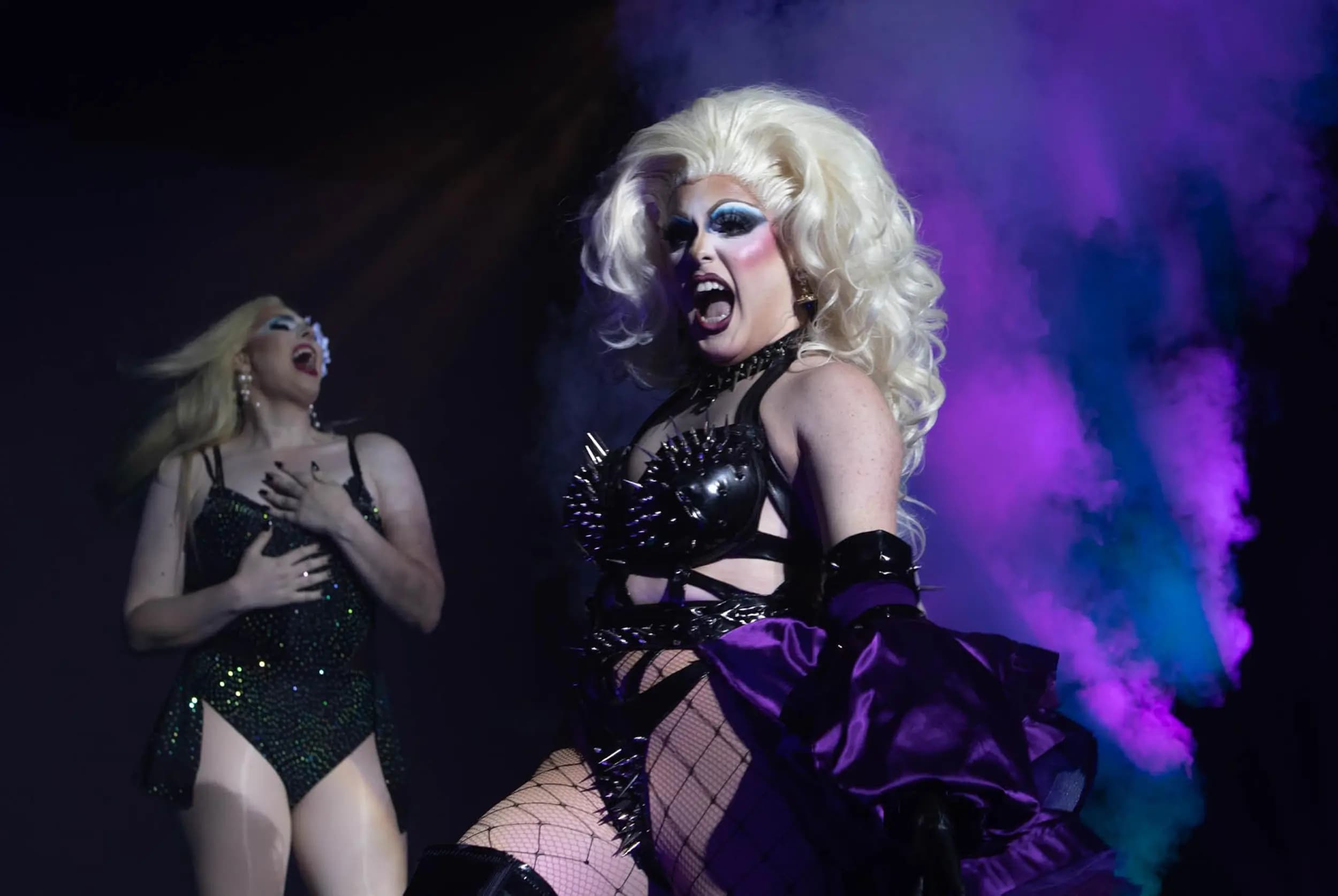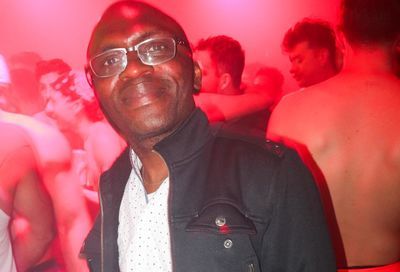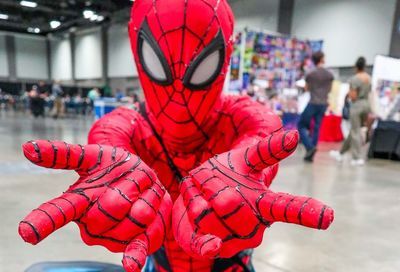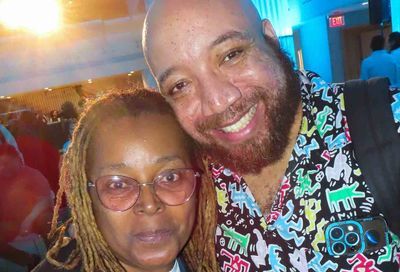About a Bwoy: An exclusive interview with Anthony Rapp
Anthony Rapp talks about playing a man obsessed, the years he spent on Broadway in Rent, and (shhh!) his historic role as a gay character on the new Star Trek.

“I can’t imagine the film without Anthony,” says John G. Young, director of bwoy. “This is what they call a micro budget feature. It’s a tiny movie — and it really sinks or swims on the performances in it.”
The performance given by Anthony Rapp in this tense, unsettling thriller about obsession, deception, and coping with grief and one’s true nature, is nothing short of mesmerizing. As Brad, a former doctor for whom a personal tragedy has taken a tremendous toll, he’s in nearly every scene, the camera frequently trained on him in extreme close-up while he chats online with Yenny, a young Jamaican man who commands the character’s attention, his lust, and, ultimately, his pocketbook.
“For the first 15 minutes of the film, it’s Anthony’s face, not even talking,” says Young, who filmed bwoy over ten days on a miniscule budget of $20,000. “He’s reacting to a screen, which can absolutely be deadly. I think that because he’s just so remarkably skilled, he was able to bring those scenes to life. Make them more than just somebody reading text on screen. You get a sense that he’s interacting with it, that he’s in the moment.”
Bwoy‘s narrative is virtually Hitchcockian in the way it reveals certain stark, surprising truths, slowly edging toward a climax that has inevitability and dread scrawled all over it. A look at how one man copes with the brutal way his secrets precipitated a grave, unrectifiable tragedy, the film resonates with sorrow and longing. Yet it also bursts with moments of joy and revelation, mostly thanks to a captivating, ebullient performance from Rapp’s co-star Jimmy Brooks as Yenny. As a director, Young is no stranger to somber material. His debut effort, 1995’s Parallel Sons, opened that year’s Reel Affirmations to extraordinary acclaim. It’s fitting, then, that his newest achievement is getting an area premiere at Reel Affirmations Xtra this Friday, March 24, at the HRC Equality Center on Rhode Island Avenue NW.
For his part, Rapp welcomed the experience to play what he considers a character with darker tendencies. “There’s something about that exploration of human beings’ darker impulses that always really fascinates me,” he says over the course of a wide-ranging 45-minute conversation that covers everything from his screen debut in Adventures in Babysitting to the rise of his Broadway star in Rent to his most recent role on the forthcoming Star Trek series, in which he’ll play a Starfleet officer who also happens to be gay. Playing Brad, he notes, was a “really, really intimate and vulnerable” experience.
“Anthony’s got an incredibly expressive face,” Young enthuses. “Watch it and you feel like you’re inside his brain reacting at the same time he is. There’s no doubt that bwoy needed someone of Anthony’s caliber to succeed.”

METRO WEEKLY: You started acting at six years old. What leads a person to start acting at that age?
ANTHONY RAPP: Mom was a nurse and she got a job at a summer camp, and my brother Adam, my sister and I went to the camp with her for the summer. I don’t know why, but I auditioned for the [camp] show, and got cast as the Cowardly Lion in The Wizard of Oz. I was hooked. Went back the next summer, did two more shows, and then, when I returned home after that second summer, I started doing community theater.
MW: No stage mother syndrome here. It was all you.
RAPP: The cliché is the crazy stage mother, but my mom was the complete opposite. It was always my desire, it was always my hope, it was always my pursuit. And she was just doing whatever she could to help make it happen. I don’t even know how she did it, in terms of scheduling, making sure I could get to rehearsals and whatever. Adam was an athlete, and he was doing his basketball or baseball practices, and she made it all work as a single mom.
MW: Your first professional job was at age nine. How did that come about?
RAPP: A community theater director I was working with was incredibly encouraging to my mom to look for special work for me after I did several shows with him. We lived near Chicago, and I auditioned for a couple things and got cast in the road company of Evita, which was sitting down in Chicago at the time. That’s how I got my equity card, my first professional job, when I was nine.
MW: A nine-year-old in Evita?
RAPP: Yeah. In the original Harold Prince direction there were four kids in two or three scenes. Little, tiny cameos. It counted. Then I was working with agents, and kept auditioning and getting work. I think it’s a lot easier to break in as a kid if you have any talent because there’s just not as many of you.
MW: Did you actually enjoy the work at that age?
RAPP: I loved it, I loved it. I always felt totally at home, totally comfortable, and was fortunate to get a lot of support and great feedback. We didn’t know anything about show biz. It’s a very different landscape now, too, because of reality TV and talent shows on TV. There’s this whole thing of “be discovered and become a star.” Back then, it was never about pursuing being a star. We just literally put one foot in front of the other in a very naïve way and it kind of worked out.
MW: When did you first realize you were gay?
RAPP: I do not remember when I became aware of any labels. I really don’t. I look back and it’s a little weird to me, in the sense that I grew up in professional theater, so I was around gay people. I had crushes on girls and boys. It wasn’t until my teenage years that I started to think, “I don’t know how this is going to go, if it’s going to be problematic.”
MW: When did you come out?
RAPP: When I was 14, I had a one-night encounter with a slightly older kid from high school. My mom found out about it. She confronted me. It wasn’t a coming-out — I was like, “This is something I’ve wanted to do.” I stood up for myself in this unusually bold way, but she was worried that I’d been taken advantage of by an older kid. It wasn’t a moral issue for her. She was just worried.
This was in the early ’80s and she also had been seeing actors that I’d worked with professionally who were sick from AIDS, and had died. She was really concerned about my health and wellbeing. I don’t think there were many, if any, AIDS cases that she was personally dealing with as a nurse in Joliet, but she was very aware of it. She was really scared and concerned about that. After we had that conversation, I was like, “Maybe if she’s concerned, I need to be more concerned.” Until that point I don’t remember having any personal torment in my head about it.
There were a couple of years where I was much more cautious, and careful — I guess I would consider that the closeted time. Then a couple years later, when I went to NYU, where I was only for one semester, I had my first real boyfriend. I really came out to her then, and we had the much more direct conversation about what it all meant.

MW: You mentioned not being aware of labels. In the past, you have been quoted as saying that you don’t them. Did you not want the identification as a gay man at that point?
RAPP: It’s not that I didn’t want the identification, it’s that I do believe in the spectrum, and at the time, especially when I was having those interviews, it felt a little strange to me. It felt like to completely say, “Yes, I’m one hundred percent homosexual” would invalidate any relationships or experiences that I’d had with women. I know that there are some gay men for whom they’ve never had any desire or experiences with women, and that’s one hundred percent the case with them. For me, it wasn’t.
MW: But your preference is men.
RAPP: I do prefer men. I’ve always been very open about that. I don’t really care anymore about labels, per se, but I think it’s interesting to talk about the whole spectrum of the experiences. I think for some people, when they think that public figures say something like what I said, they’re trying to obfuscate or hide. I wasn’t trying to do that — I was trying to have an open conversation about the nature of sexuality, and that there’s a fluidity to it to some degree in some cases. I’ve always liked the word “queer,” because it’s an umbrella word that covers all of it. I also like the fact that “queer” was reclaimed from being an epithet to being a word that’s empowering.
MW: Given that you’ve had relationships with both men and women, do you feel that your attraction to men is stronger either sexually or emotionally?
RAPP: Both. Both. One hundred percent both. It’s definitely stronger and clearer. It feels more appropriate, more right.
I know that a lot of people say that bisexuality is the shortcut to then coming out fully as gay. I understand all sides. There’s an actor, Andy Mientus, who’s a friend of mine. He’s married to a man. He’s been very open in sharing their relationship. He’s also committed to talking about bisexuality, and bisexual invisibility. I applaud him for that. It’s a really valid and interesting thing to continue to talk about.
MW: Your career has had several gay touchstones to it. Obviously Rent is a huge one. You were a gay man playing a straight man in a show that had significant gay content.
RAPP: It was a cool thing at the time that I celebrated — which was that I was queer playing straight and the straight actors were playing queer. Part of what, to me, makes the show special, is that all of these labelled things about these characters are never directly talked about. They just are. People are who they are in the show. The only status thing that’s really talked about at any length is HIV status. The rest of it is just this is who they are, this is the tapestry of the community in which everyone lives, and there’s no muss, no fuss made about any of those aspects of their lives. That’s one of the things that I loved about it, and am very proud of it. I do think it’s relevant and interesting to remark, 20 years later, that that was the case.
MW: Rent just embarked on a 20th Anniversary national tour. What do you think accounts for its popularity and longevity?
RAPP: A lot of different things. It’s based on La Boheme, an opera over one hundred years old, which is a classic for many reasons, not least of which is that it speaks eloquently about the power of love and community in the face of tragedy and struggle, as does Rent. Those are universal themes that transcend space, and time, and circumstance. They both have beautiful scores — music that stands the test of time, and gets in people’s hearts and minds and souls in a way that lesser music doesn’t.
Both have very vivid characters, identifiable human beings and people take these characters into their hearts. I don’t know for sure if people say this about La Boheme, but the messages of Rent, and how it talks about what it has to say about time, and mortality, and love, changes people’s lives. It changes people’s perspectives.
MW: Do you think those messages are as relevant today as they were then?
RAPP: Absolutely. The circumstance of an HIV diagnosis today is very different than the circumstance of one twenty years ago. But the circumstances of facing your own mortality, for whatever reason, transcend the specifics of AIDS and HIV. Losing someone you love can happen to anyone at any time, so that transcends the specifics of AIDS and HIV. So, yes, it’s absolutely relevant. It’s a period piece, and it’s very specifically about a very specific time and place in New York City, in this specific community, that was dealing with a specific disease. It transcends all those things.
MW: You wonder what kind of product would have come from Jonathan Larson had he lived, what kind of musicals would have been created and what kind of composer he would have grown into. But there seem to be many others who have picked up the gauntlet. You have Benj Pasek and Justin Paul.
RAPP: And Lin-Manuel Miranda. And Tom Kitt and Brian Yorkey. Those two in particular, I know for a fact, were profoundly affected by what Jonathan had done with Rent. The past ten to twenty years have really been inspiring these younger writers to step further into the territory that Jonathan had staked out, which is telling stories about people who were in the real world using contemporary music.
In understanding that you have to have songs that don’t just have great books, musically, but also tell a story and move the story forward, and have character ideas, and all that stuff. Yes, I think that it’s a vibrant, incredible time, and I do give Jonathan Larson enormous credit in what’s happening now, even though he’s not here to witness it. It’s incredibly sad that he’s not here, but I think that he would be thrilled.
MW: You were in Rent on Broadway for two years. What is it like to go up every night, eight shows a week, and play something for two solid years like that?
RAPP: It’s invigorating. It’s a grind. It’s exhausting. On top of all that craziness, I was also dealing with a very intense personal experience. My mom was in the last year of her life during the first year of the run. I was going home to visit her, and that was enormously stressful and painful. At the same time, I had this huge success. The experience of being at the Nederlander Theater eight times a week for those two years — there was never an empty an seat in the house. Every audience was hugely responsive. It was so fulfilling. At the time when Rent started, I’d been working professionally for fifteen years. I’d paid some dues to get there. I really knew what a rare experience it was. And I soaked up every inch of it as I could.
MW: Let’s talk a bit about your film career. Your first film, I remember very well. Adventures in Babysitting, a fun, great movie. This is its 30th anniversary. Does it blow your mind that it’s considered a classic now?
RAPP: Yeah, it does. It was on TV the other night. My boyfriend, Ken, was flipping channels and he came across it. I watched a little bit of it and I laughed. It certainly feels like a period, in its look and tone, but I really do think it holds up. The comedy of it holds up, and the performances hold up well. It’s got a really great soundtrack.
I am fully aware how spoiled I was by that experience. It was a joyful, joyful thing to be a part of. Chris Columbus, it was his first film — he had written Goonies, Gremlins, and Young Sherlock Holmes at that time, but it was his first directing gig. He was so accomplished, and friendly, and collaborative, and easy to work with. Now, having done a number of other films and TV work over the years, I’ve mostly been pretty lucky in terms of things have gone smoothly and well, but the way that that film came together, for my first film experience, I was spoiled by it.

MW: Let’s talk about bwoy. You’re not just the star, but also one of the producers. Talk a little bit about the formation of this project, and what it means to you.
RAPP: I actually met the director, John Young, back in the day, because I knew the lead of Parallel Sons. We had maybe a dinner or something. I got an email out of the blue, saying he wanted to have dinner to discuss a new film project. I was like, “Okay, sure.” He sent me the script, and I was really taken by it. I’m always very interested in stories and characters that explore the darker nooks and crannies of human experience. Some of my favorite performances of all time are, I guess, considered villains. Complicated, really sometimes disturbed people, like Anthony Hopkins in Silence of the Lambs, and Ralph Fiennes in Schindler’s List. There’s something about that exploration of human beings’ darker impulses that always really fascinates me. I felt like this script really got some of that stuff in a very honest and compelling way. It didn’t try to hand any of it over to the audience on a silver platter. It just lets it be itself. I felt very taken by it, and somehow felt like I could get inside of Brad’s mind and heart in a way that I could bring him to life.
We had a really good dinner meeting with John in which we talked about that. It just worked out perfectly with my schedule. Everything fell right into place. I was very proud and excited to be able to be given a chance to carry a film like this.
MW: You do a lot with silence in this film. There are several shots of you in silent contemplation, eating a sandwich, just something to convey a sense of character mood. Is that more difficult than playing dialogue?
RAPP: I don’t think so. It’s one of the gifts of film that you can have that kind of stuff, and it can be meaningful and communicative. That can happen on stage, too, to some degree, but there is something about being able to be with a character’s inner-self in a close-up that is a little extra. I couldn’t exactly tell you why, but I felt like I understood Brad. Even though I’ve never had crazy, compulsive situations, there’s just something about it. I’ve always felt compassion for people who act out.

MW: It’s interesting, but Brad often downcasts his eyes when speaking with Yenny, or he looks off to the side slightly. There’s a really interesting resonance to that. Was that instinctive or were you doing that purposefully?
RAPP: I don’t know, honestly. These kinds of things aren’t like, I consciously think to myself, “I’m going to look down now.” I’m just in the moment as much as possible. For Brad, there are certain things that are too difficult to face. The lies, and stuff like that. I don’t think Brad is very accomplished at lying. I don’t think that Brad has a lot of experience at this sort of thing. I just don’t think he’s very comfortable in his own skin for so many reasons.
MW: I was surprised he didn’t password protect his computer. He seems to want his activities to be discovered.
RAPP: Yes, absolutely, yes. People act out and they leave trails. He’s not a master criminal. He’s just doing a thing, and gets so swept up in it. On some level, it would be much easier to be found out than to confess.
MW: Are you ultimately pleased with your performance?
RAPP: I am very, very proud of it. And I’m glad that it’s going to have some kind of life. I know it’s a hard landscape these days for independent films, although to see what happened for Moonlight is such a thrill. As a fellow artist walking this path, to see that such a brilliant depiction of intimate, human lives can achieve the kind of success it’s achieved is just thrilling. I know that it’s really hard to get your content to be seen. There’s so much demand, and to whatever degree that our film can be seen and appreciated is really exciting.
MW: I don’t know what you can say about it, but I’d be remiss if I didn’t bring up Star Trek: Discovery.
RAPP: I can say that I’m in it, and that I’m really excited about it. I pretty much am not allowed to say anything else. I don’t even know if I’m allowed to say that. It’s so profoundly under wraps, which I completely understand and actually endorse. But I’m really excited.
MW: It’s been reported that the character you’re playing is gay.
RAPP: Yeah. Anything that’s been reported in the press, and has officially been confirmed by CBS, I can say.
MW: How does it feel, from a perspective of a gay man, to be playing the first ongoing gay character in Star Trek, Sulu’s recent revelation in the films notwithstanding?
RAPP: I’m honored. I’m also honored to be a part of a piece of work that’s part of the cultural pantheon. It’s kind of crazy that I get to be a part of something that means so much to so many people. It meant a lot to me, too. I’m thrilled and I’m honored to be the vehicle for this aspect of the story that’s being told.
MW: Have you ever been to Comic Con? Are you ready for what’s about to happen to your life?
RAPP: I haven’t been to Comic Con, but I’ve been to BroadwayCon. I helped found that. The Rent phenomenon was much smaller, in many ways, but I think it gave me a taste of what it can be like. I have a couple friends who are huge Trek fans, so they’ve kind of given me the heads up that what’s coming my way. I’m as ready as I can be. The thing I hope the most is that the work is good and well-received, and that we can all be proud of it.

MW: The gay community uses Grindr, Scruff, online apps like Brad uses in bwoy. Have you ever, at least before your relationship, actually used one of these apps? Or are they off-limits for celebrities?
RAPP: I have, a little bit. I probably was a little less careful, but I didn’t send certain kinds of pictures, ever. I felt like that would be something to be smart about. I might have been a little less cautious than I should be. Certainly, going forward, I have to be even that much more cautious. But I’m in a committed, monogamous relationship, so it’s a moot point. If I were single now, yes, I would be even more cautious, given what could be coming my way in terms of visibility.
MW: Before you head out, let’s talk President Trump. Where do you stand on our current administration?
RAPP: The election night was a nightmare. My friend, who’s also a big Trek fan, is a U.S. history professor. I asked him a sincere question: “How is this really different from what happened in Germany in the ’30s?” He said, for him, the comfort is that Germany is a more monolithic society in general, a much more conformist society in general. It’s not the pluralistic society that America is. His hope is that there will be the kind of resistance to this fascist stuff that’s coming our way. I think my observation, in New York anyway, is that there’s this enormous resistance from all corners.
The challenge, I guess, is how do we marshal all this energy for the good? I think that that’s happening in all sorts of ways. There’s good that comes out of every situation. In this case, it’s going to embolden and strengthen the left, including the gay community, in ways that we maybe needed, to coalesce that much more strongly together.
MW: Are you worried?
RAPP: I’m worried about things that can happen globally as a result of this administration. I’m in a pretty privileged position, so I’m not sure that anything in my life will be directly impacted in a negative way. But I’m worried for many people. I’m worried for immigrants. I’m worried for transgender people, certainly. I’m worried for Jewish people. I’m worried that the people who are not in my position, or the position of so many of us, are in real trouble.
MW: It looks as though the NEA might get defunded or even discontinued. Speaking as an artist, do you think that this country respects culture and the arts enough?
RAPP: No, I don’t. Certainly not from a government standpoint. My hope is that enough individuals, and in some cases corporations, would step up. It’s sort of like what’s happened with the ACLU. There’s this enormous influx of financial support for the ACLU in recognition of the fight. I would hope that there would be a rallying cry to somehow create that support for people if things like the defunding of the NEA happen.
MW: Finally, will we ever see you back on Broadway?
RAPP: I hope so.
MW: What would be your dream role?
RAPP: I don’t know. I never would’ve guessed that playing a documentary filmmaker in a rock opera would’ve been my dream role, but that worked out.
Bwoy screens as part of the Reel Affirmations Xtra Film Series on Friday, March 24, at 7 p.m. at the HRC Equality Center, 1640 Rhode Island Ave. NW. Metro Weekly contributor Andre Hereford will lead a Q&A session with director John Young following the screening. Tickets are $12. VIP tickets, which include 1 complimentary cocktail, beer or wine, are $25. Visit thedccenter.org/events/bwoy.
Bwoy will be released on DVD and will be available for streaming on iTunes, Amazon Instant, Google Play, Vudu, and on demand from local cable and satellite providers on April 4.
Anthony Rapp will appear with his former Rent co-star Adam Pascal for an evening of song on on Friday, April 28, at 8 p.m. at The Music Center at Strathmore, 5301 Tuckerman Lane, Bethesda, Md. Tickets are $30 to $75. Call 301-581-5100 or visit strathmore.org.
Support Metro Weekly’s Journalism
These are challenging times for news organizations. And yet it’s crucial we stay active and provide vital resources and information to both our local readers and the world. So won’t you please take a moment and consider supporting Metro Weekly with a membership? For as little as $5 a month, you can help ensure Metro Weekly magazine and MetroWeekly.com remain free, viable resources as we provide the best, most diverse, culturally-resonant LGBTQ coverage in both the D.C. region and around the world. Memberships come with exclusive perks and discounts, your own personal digital delivery of each week’s magazine (and an archive), access to our Member's Lounge when it launches this fall, and exclusive members-only items like Metro Weekly Membership Mugs and Tote Bags! Check out all our membership levels here and please join us today!
























You must be logged in to post a comment.